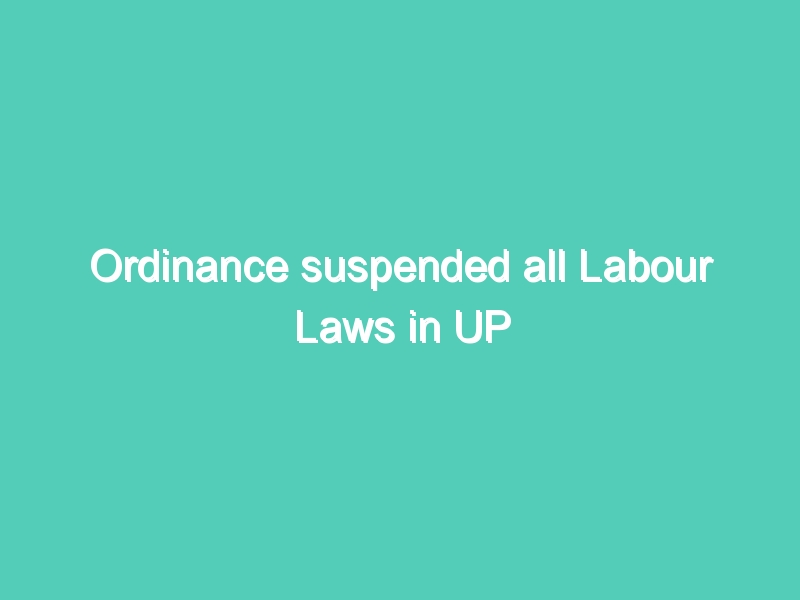The Uttar Pradesh government, lately has passed an ordinance that businesses and employers working in Uttar Pradesh are exempted to comply with labour laws for the next 3 years. This move of the Uttar Pradesh government is backed by the intent of promoting investment in the industrial sector and also providing employment to the migrants who came back in the State.
The ordinance is yet to receive the assent from the Governor Anandiben Patel. Also, since the welfare of labour is a topic under the Concurrent list, hence, the approval of the Central Government will also be needed. The Ordinance violates Art. 42-43A of the Part IV of the Constitution i.e. Directive Principles of State Policy but these provisions do not have a binding effect. Hence, the Ordinance is constitutionally valid.
The Uttar Pradesh Temporary Exemption from certain Labour Laws Ordinance, 2020 is put forward with a view to encourage more businesses and employers to set up their establishments or organizations in Uttar Pradesh which would ultimately yield more employment opportunities for the migrant workers who have returned back from other places in India and investments needed to put the economy of the State back on the usual track. Shivraj Singh Chauhan led Madhya Pradesh Government got inspired by the Uttar Pradesh Government’s decision and also introduced changes in the key labour legislations to attract the performance of more economic activities in the State[1].
According to the labour department sources, some 40 kinds of labour laws are enforced in U.P., out of which 7-8 are being retained[2].
The Ordinance put forward by the Uttar Pradesh Government suspend laws relating to industrial disputes, Health and working conditions of workers, Trade Unions, Contract Workers, and Migrant workers.
However, there are some exceptions as well to the ordinance: The Bonded Labour System (Abolition) Act, 1976, The Employee Compensation Act, 1923, The Building and Other Construction Workers’ Act, and Section 5 of the Payment of Wages Act, 1936[3]. So, after the implementation of the said Ordinance, the labour laws in Uttar Pradesh may be summed up as follows:
- No one is allowed to keep a bonded labourer and if does, will be punished for the same.
- Laws relating to compensation paid to workers in case of injury arising out of the and in the course of employment will remain intact.
- Laws related to the protection of workers in the construction industry will be the same.
- The workers must get their wages on time as prescribed in Section 5 of the Payment of Wages Act, 1936.
Hence, it can be made out from the ordinance that the following legislations may be ineffective for the next 3 years in the territory of Uttar Pradesh:
- The Industrial Disputes Act, 1947
- The Industrial Employment (Standing Orders) Act, 1946
- The Trade Unions Act, 1926
- The Employees’ State Insurance Act, 1948
- The Employees’ Provident Funds and other Miscellaneous Provisions Act, 1952
- The Minimum Wages Act, 1948
- All provisions of Payment of Wages Act, 1936 except Section 5
- The Factories Act, 1948
- The Industrial (Development and Regulation) Act, 1951
- The Payment of Bonus Act, 1965
- The Apprentices Act, 1961
- The Payment of Gratuity Act, 1972
- The Contract Labour (Regulation and Abolition) Act, 1970
- The Equal Remuneration Act, 1976
- The Mines Act, 1952
- The Inter-State Migrant workmen (Regulation of Employment and Conditions of Service) Act, 1979
- State legislations related to labour.
It is therefore, an undisputed fact that labour laws will take a big turn in Uttar Pradesh for the next 3 years. The workers’ class in the state of Uttar Pradesh will not have access to a lot of rights associated with the status of workmen.
Workers in Uttar Pradesh will not be able to participate in strikes for even lawful purposes. The said ordinance will also cease the operational nature of trade unions in various establishments in Uttar Pradesh. The class of workers will be deprived of various benefits vested in them like provident fund, ESI fund, Minimum wages, decent working conditions in factories and mines, bonus, gratuity, and other benefits.
The businesses or employers and contractors of workers will not be expected to conduct their affairs in relation to their workers in accordance with the Labour Laws. This Ordinance may generate more employment opportunities for workers that were already in the State and the migrant workers who came back due to the crisis of COVID-19. But the ordinance will also generate more opportunities for employers and contractors to engage in practices that result in abuse of the rights of workers with no legal consequences to be followed from their actions.
Among the class of workers, the most vulnerable group is of migrant workers who have returned back to the State. The Contractors will be absolved from the duties and obligations cast upon them under the Inter-state Migrant workmen (Regulation of Employment and Conditions of Service) Act, 1979. Hence, the Contractor is under no obligation to provide the inter-state migrant workers with the passbook which mentions the details as specified in Section 12 of the Act. The migrant workers may be treated as inferior to other workers in the establishment, may not be given the same wages as other workers, may have to work without the employer paying any heed to the conditions of service, holidays, hours of work, etc. Migrant workers won’t possess the right to displacement allowance and journey allowance. The contractors of these migrant workers will be absolved from the duty to ensure equal pay, suitable conditions of work, provide and maintain suitable residential accommodation, medical facilities for free, protective clothing, etc. The migrant workers stand as the most vulnerable group among all the classes of workmen for they are usually not aware of all their rights and the contractors’ and principal employers’ duties and obligations. Migrant workers don’t usually have the support of other workers of the organization and hence, need more protection.
The Ordinance by Uttar Pradesh Government will surely boost investment in the State economy but will not ensure the protection of migrant workers who came back to the State due to the COVID-19 crisis from the abusive practices of the employers and their contractors. The Uttar Pradesh Government requires more investment in the state economy to recover from the economic recession it faced because the national lockdown caused many businesses and economic activities to halt. Yogi Adityanath, the Chief Minister of the state of Uttar Pradesh made an amendment to draw new investment for the State from China in the post-lockdown phase to support the economy. Though the Ordinance will yield positive results in investment and employment opportunities, it will also give the owner of factories more power to hire and fire workers without attracting punitive measures from the Labour Department up to a certain limit[4].
Uttar Pradesh Chief Secretary RK Tiwari mentioned that labour laws related to women and children had been kept intact[5]. But it isn’t enough to protect the rights of women and children. Suspension of all other labour laws will ultimately affect women workers and children indirectly.
The biggest default is the withdrawal of the Industrial Disputes Act, 1947 as it will lead to a situation where the parties have to settle their disputes without any help from the legal fraternity which will surely lead to exploitation of workers’ class because the employer will have undue influence over the workers. The non-operational nature of the Factories Act will result in the compromise of the safety of workers in the factory premises.
Also, the said Ordinance goes against the ILO conventions ratified by India. The state governments cannot do anything once the parliament ratifies these Conventions. It may even cause the ILO to issue a show-cause notice to India for the concerned Ordinance.
The Bharatiya Mazdoor Sangh (BMS) President, Shri Saji Narayanan says that the country needs bureaucratic reforms and the ordinance by UP government will lead to a bigger pandemic. He added that India is a democratic country and it is not possible to subject labourers of the nation to such an arbitrary Ordinance. He further added that he will discuss the issue with office bearers in both the states and decide upon the course of action in the next few days[6].
Critical Analysis
A Critical Analysis of the situation would reveal that the Ordinance will surely boost investment in the State economy and encourage more businesses to be set up. But the other side of the coin will lead to the exploitation of workers in the informal sector. The weakest group among the workmen in Uttar Pradesh are the migrant workers who originally belong to UP but came back from their places of work due to the ongoing COVID-19 crisis, contract labourers, workers employed in factories, workers who were the members of trade unions, etc. Also, the industrial disputes between workmen and employer will always result either in the employer firing all the workmen involved in the dispute because the employers will now have an upper hand due to the non-operational nature of the Industrial Disputes Act, 1947.
An effective solution with less chaos could’ve been reducing the formalities in the expansion of business and industrial units and the establishment of new businesses. That would’ve aided both the workers and employers by increasing investments in the economy with no cost of divesting workers of their rights under the labour laws.
[1] Gautam Chikermane and Rishi Agrawal, “COVID-19: Shivraj Singh Chauhan initiates reforms 2.0 in Madhya Pradesh”, Observer Research Foundation, available at: https://www.orfonline.org/expert-speak/covid19-shivraj-singh-chouhan-initiates-reforms-2-madhya-pradesh-65867/ (Last visited on 9th May; 2020)
[2] “UP suspends major labour laws for 3 years to attract investors”, The New Indian Express, available at: https://www.newindianexpress.com/nation/2020/may/08/up-suspends-major-labour-laws-for-3-years-to-attract-investors-2140784.html (Last visited on 8th May; 2020)
[3] “India moves big labour law changes to limit coronavirus impact; UP, MP, Punjab, others make these changes”, Financial Express, available at: https://www.financialexpress.com/economy/labour-reforms-laws-rules-change-uttar-pradesh-up-madhya-pradesh-rajasthan-himachal-pradesh-punjab-kerala-coronavirus-reforms/1952023/ (Last visited on 9th May; 2020)
[4] “UP allows industry to hire and fire! Suspends all labour laws, except three”, Business Today, available at: https://www.businesstoday.in/current/economy-politics/industry-unshackled-in-uttar-pradesh-all-labour-laws-but-three-suspended-for-3-years/story/403189.html (Last visited on 9th May; 2020)
[5] “Uttar Pradesh brings ordinance to suspend most labour laws for 3 years”, The Economic Times, available at: https://economictimes.indiatimes.com/news/economy/policy/uttar-pradesh-brings-ordinance-to-suspend-most-labour-laws-for-3-years/articleshow/75609934.cms (Last visited on 9th May; 2020)
[6] “Labour Law changes in UP, MP a bigger pandemic in the offing: BMS President”, Business Standard, available at: https://www.business-standard.com/article/economy-policy/labour-law-changes-in-up-mp-a-bigger-pandemic-in-the-offing-bms-president-120050801134_1.html (Last visited on 9th May; 2020)
-Muskan Sharma
(Jamia Millia Islamia)



